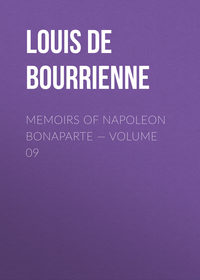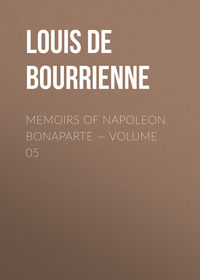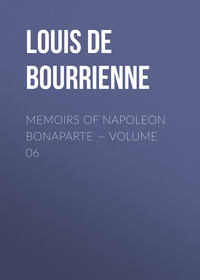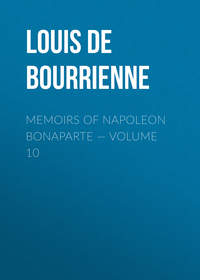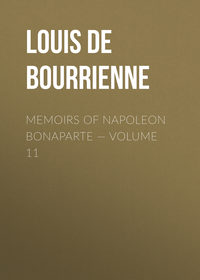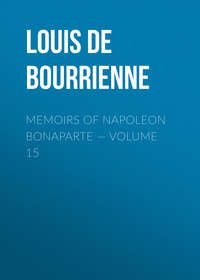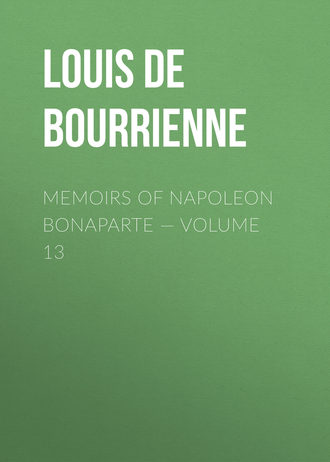 полная версия
полная версияMemoirs of Napoleon Bonaparte — Volume 13
The two Emperors set off from Paris shortly after each other. The Emperor of Austria arrived first at Rambouillet, where he was received with respect and affection by his daughter. Maria Louisa was happy to see him, but the many tears she shed were not all tears of joy. After the first effusion of filial affection she complained of the situation to which she was reduced. Her father sympathised with her, but could offer her no consolution, since her misfortunes were irreparable. Alexander was expected to arrive immediately, and the Emperor of Austria therefore informed his daughter that the Russian monarch wished to see her. At first Maria Louisa decidedly refused to receive him, and she persisted for some time in this resolution. She said to her father, "Would he too make me a prisoner before your eyes? If he enters here by force I will retire to my chamber. There, I presume, he will not dare to follow me while you are here." But there was no time to be lost; Francis II. heard the equipage of the Emperor of Russia rolling through the courtyard of Rambouillet, and his entreaties to his daughter became more and more urgent. At length she yielded, and the Emperor of Austria went himself to meet his ally and conduct him to the salon where Maria Louisa remained, in deference to her father. She did not, however, carry her deference so far as to give a favourable reception to him whom she regarded as the author of all her misfortunes. She listened with considerable coldness to the offers and protestations of Alexander, and merely replied that all she wished for was the liberty of returning to her family. A few days after this painful interview Maria Louisa and her son set off for Vienna.
—[A few days after this visit Alexander paid his respects to Bonaparte's other wife, Josephine. In this great breaking up of empires and kingdoms the unfortunate Josephine, who had been suffering agonies on account of the husband who had abandoned her, was not forgotten. One of the first things the Emperor of Russia did on arriving at Paris was to despatch a guard for the protection of her beautiful little palace at Malmaison. The Allied sovereigns treated her with delicacy and consideration.
"As soon as the Emperor Alexander knew that the Empress Josephine had arrived at Malmaison he hastened to pay her a visit. It is not possible to be more amiable than he was to her. When in the course of conversation he spoke of the occupation of Paris by the Allies, and of the position of the Emperor Napoleon, it was always in perfectly measured language: he never forgot for a single instant that be was speaking before one who had been the wife of his vanquished enemy. On her side the ex-Empress did not conceal the tender sentiments, the lively affection she still entertained for Napoleon . . . . Alexander had certainly something elevated and magnanimous in his character, which would not permit him to say a single word capable of insulting misfortune; the Empress had only one prayer to make to him, and that was for her children."]—
This visit was soon followed by those of the other Allied Princes.
"The King of Prussia and the Princes, his sons, came rather frequently to pay their court to Josephine; they even dined with her several times at Malmaison; but the Emperor Alexander come much more frequently. The Queen Hortense was always with her mother when she received the sovereigns, and assisted her in doing the honours of the house. The illustrious strangers exceedingly admired Malmaison, which seemed to them a charming residence. They were particularly struck with the fine gardens and conservatories."
From this moment, however, Josephine's health rapidly declined, and she did not live to see Napoleon's return from Elba. She often said to her attendant, "I do not know what is the matter with me, but at times I have fits of melancholy enough to kill me." But on the very brink of the grave she retained all her amiability, all her love of dress, and the graces and resources of a drawing-room society. The immediate cause of her death was a bad cold she caught in taking a drive in the park of Malmaison on a damp cold day. She expired on the noon of Sunday, the 26th of May, in the fifty-third year of her age. Her body was embalmed, and on the sixth day after her death deposited in a vault in the church of Ruel, close to Malmaison. The funeral ceremonies were magnificent, but a better tribute to the memory of Josephine was to be found is the tears with which her children, her servants, the neighbouring poor, and all that knew her followed her to the grave. In 1826 a beautiful monument was erected over her remains by Eugene Beauharnais and his sisters with this simple inscription:
TO JOSEPHINE. EUGENE. HORTENSE.CHAPTER II
1814.
Italy and Eugene—Siege of Dantzic-Capitulation concluded but not ratified-Rapp made prisoner and sent to Kiow—Davoust's refusal to believe the intelligence from Paris—Projected assassination of one of the French Princes—Departure of Davoust and General Hogendorff from Hamburg—The affair of Manbreuil—Arrival of the Commissioners of the Allied powers at Fontainebleau—Preference shown by Napoleon to Colonel Campbell—Bonaparte's address to General Kohler—His farewell to his troops—First day of Napoleon's journey—The Imperial Guard succeeded by the Cossacks—Interview with Augerean— The first white cockades—Napoleon hanged in effigy at Orgon—His escape in the disguise of a courier—Scene in the inn of La Calade— Arrival at Aix—The Princess Pauline—Napoleon embarks for Elba—His life at Elba.
I must now direct the attention of the reader to Italy, which was the cradle of Napoleon's glory, and towards which he transported himself in imagination from the Palace of Fontainebleau. Eugene had succeeded in keeping up his means of defence until April, but on the 7th of that month, being positively informed of the overwhelming reverses of France, he found himself constrained to accede to the propositions of the Marshal de Bellegarde to treat for the evacuation of Italy; and on the 10th a convention was concluded, in which it was stipulated that the French troops, under the command of Eugene, should return within the limits of old France. The clauses of this convention were executed on the 19th of April.
—[Lord William Bentinck and Sir Edward Pellew had taken Genoa on the 18th Of April. Murat was in the field with the Austrians against the French.]—
Eugene, thinking that the Senate of Milan was favourably disposed towards him, solicited that body to use its influence in obtaining the consent of the Allied powers to his continuance at the head of the Government of Italy; but this proposition was rejected by the Senate. A feeling of irritation pervaded the public mind in Italy, and the army had not proceeded three marches beyond Mantua when an insurrection broke out in Milan. The Finance Minister, Pizna, was assassinated, and his residence demolished, and nothing would have saved the Viceroy from a similar fate had he been in his capital. Amidst this popular excitement, and the eagerness of the Italians to be released from the dominion of the French, the friends of Eugene thought him fortunate in being able to join his father-in-law at Munich almost incognito.
—[Some time after Eugene visited France and had a long audience of Louis XVIII. He announced himself to that monarch by his father's title of Marquis de Beauharnais. The King immediately saluted him by the title of Monsieur le Marechal, and proposed that he should reside in France with that rank. But this invitation Eugene declined, because as a French Prince under the fallen Government he had commanded the Marshals, and he therefore could not submit to be the last in rank among those illustrious military chiefs. Bourrienne.]—
Thus, at the expiration of nine years, fell the iron crown which Napoleon had placed on his head saying, "Dieu me l'a donne; gare a qui la touche."
I will now take a glance at the affairs of Germany. Rapp was not in France at the period of the fall of the Empire. He had, with extraordinary courage and skill, defended himself against a year's siege at Dantzic. At length, being reduced to the last extremity, and constrained to surrender, he opened the gates of the city, which presented nothing but heaps of ruins. Rapp had stipulated that the garrison of Dantzic should return to France, and the Duke of Wurtemberg, who commanded the siege, had consented to that condition; but the Emperor of Russia having refused to ratify it, Rapp, having no means of defence, was made prisoner with his troops; and conducted to Kiow, whence he afterwards returned to Paris, where I saw him.
Hamburg still held out, but at the beginning of April intelligence was received there of the extraordinary events which had delivered Europe from her oppressor. Davoust refused to believe this news, which at once annihilated all his hopes of power and greatness. This blindness was persisted in for some time at Hamburg. Several hawkers, who were marked out by the police as having been the circulators of Paris news, were shot. An agent of the Government publicly announced his design of assassinating one of the French Princes, in whose service he was said to have been as a page. He said he would go to his Royal Highness and solicit to be appointed one of his aides de camp, and that, if the application were refused, as it probably would be, the refusal would only confirm him in his purpose.
At length, when the state of things was beyond the possibility of doubt, Davoust assembled the troops, acquainted them with the dethronement of the Emperor, hoisted a flag of truce, and sent his adhesion to the Provisional Government. All then thought of their personal safety, without losing sight of their honestly-acquired wealth. Diamonds and other objects of value and small bulk were hastily collected and packed up. The Governor of Hamburg, Count Hogendorff, who, in spite of some signal instances of opposition, had too often co-operated in severe and vexatious measures, was the first to quit the city. He was, indeed, hurried off by Davoust; because he had mounted the Orange cockade and wished to take his Dutch troops away with him. After consigning the command to General Gerard, Davoust quitted Hamburg, and arrived at Paris on the 18th of June.
I have left Napoleon at Fontainebleau. The period of his departure for Elba was near at hand: it was fixed for the 17th of April.
On that day Maubreuil, a man who has become unfortunately celebrated, presented himself at the Post-office, and asked to speak with me. He showed me some written orders, signed by General Saeken, the Commander of the Russian troops in Palls, and by Baron Brackenhausen, chief of the staff. These orders set forth that Maubreuil was entrusted with an important mission, for the execution of which he was authorised to demand the assistance of the Russian troops; and the commanders of those men were enjoined to place at his disposal as many troops as he might apply for. Maubreuil was also the bearer of similar orders from General Dupont, the War Minister, and from M. Angles, the Provisional Commissary- General of the Police, who directed all the other commissaries to obey the orders they might receive from Maubreuil. On seeing these documents, of the authenticity of which there was no doubt, I immediately ordered the different postmasters to provide Maubreuil promptly with any number of horses he might require.
Some days after I was informed that the object of Maubreuil's mission was to assassinate Napoleon. It may readily be imagined what was my astonishment on hearing this, after I had seen the signature of the Commander of the Russian forces, and knowing as I did the intentions of the Emperor Alexander. The fact is, I did not, and never can, believe that such was the intention of Mabreuil. This man has been accused of having carried off the jewels of the Queen of Westphalia.
Napoleon having consented to proceed to the island of Elba, conformably with the treaty he had ratified on the 13th, requested to be accompanied to the place of embarkation by a Commissioner from each of the Allied powers. Count Schouwaloff was appointed by Russia, Colonel Neil Campbell by England, General Kohler by Austria, and Count Waldbourg-Truchess by Prussia. On the 16th the four Commissioners came for the first time to Fontainebleau, where the Emperor, who was still attended by Generals Drouot and Bertrand, gave to each a private audience on the following day.
Though Napoleon received with coldness the Commissioners whom he had himself solicited, yet that coldness was far from being manifested in an equal degree to all. He who experienced the best reception was Colonel Campbell, apparently because his person exhibited traces of wounds. Napoleon asked him in what battles he had received them, and on what occasions he had been invested with the orders he wore. He next questioned him as to the place of his birth, and Colonel Campbell having answered that he was a Scotchman, Napoleon congratulated him on being the countryman of Ossian, his favourite author, with whose poetry, however, he was only acquainted through the medium of wretched translations. On this first audience Napoleon said to the Colonel, "I have cordially hated the English. I have made war against you by every possible means, but I esteem your nation. I am convinced that there is more generosity in your Government than in any other. I should like to be conveyed from Toulon to Elba by an English frigate."
The Austrian and Russian Commissioners were received coolly, but without any marked indications of displeasure. It was not so with the Prussian Commissioner, to whom he said duly, "Are there any Prussians in my escort?"—"No, Sire."—"Then why do you take the trouble to accompany me?"—"Sire, it is not a trouble, but an honour."—"These are mere words; you have nothing to do here."—"Sire, I could not possibly decline the honourable mission with which the King my master has entrusted me." At these words Napoleon turned his back on Count Truchess.
The Commissioners expected that Napoleon would be ready to set out without delay; but they were deceived. He asked for a sight of the itinerary of his route, and wished to make some alterations in it. The Commissioners were reluctant to oppose his wish, for they had been instructed to treat him with all the respect and etiquette due to a sovereign. They therefore suspended the departure, and, as they could not take upon themselves to acquiesce in the changes wished for by the Emperor, they applied for fresh orders. On the night of the 18th of April they received these orders, authorising them to travel by any road the Emperor might prefer. The departure was then definitively fixed for the 20th.
Accordingly, at ten on the morning of the 20th, the carriages were in readiness, and the Imperial Guard was drawn up in the grand court of the Palace of Fontainebleau, called the Cour du Cheval Blanc. All the population of the town and the neighbouring villages thronged round the Palace. Napoleon sent for General Kohler, the Austrian Commissioner, and said to him, "I have reflected on what I ought to do, and I am determined not to depart. The Allies are not faithful to their engagements with me. I can, therefore, revoke my abdication, which was only conditional. More than a thousand addresses were delivered to me last night: I am conjured to resume the reins of government I renounced my rights to the crown only to avert the horrors of a civil war, having never had any other abject in view than the glory and happiness of France. But, seeing as I now do, the dissatisfaction inspired by the measures of the new Government, I can explain to my Guard the reasons which induced me to revoke my abdication. It is true that the number of troops on which I can count will scarcely exceed 30,000 men, but it will be easy for me to increase their numbers to 130,000. Know, then, that I can also, without injuring my honour, say to my Guard, that having nothing but the repose and happiness of the country at heart, I renounce all my rights, and exhort my troops to follow my example, and yield to the wish of the nation."
I heard these words reported by General Kohler himself, after his return from his mission. He did not disguise the embarrassment which this unexpected address had occasioned; and I recollect having remarked at the time that had Bonaparte, at the commencement of the campaign of Paris, renounced his rights and returned to the rank of citizen, the immense masses of the Allies must have yielded to the efforts of France. General Kohler also stated that Napoleon complained of Maria Louisa not being allowed to accompany him; but at length, yielding to the reasons urged by those about him, he added, "Well, I prefer remaining faithful to my promise; but if I have any new ground of complaint, I will free myself from all my engagements."
At eleven o'clock Comte de Bussy, one of the Emperor's aides de camp, was sent by the Grand Marshal (General Bertrand) to announce that all was ready for departure. "Am I;" said Napoleon, "to regulate my actions by the Grand Marshal's watch? I will go when I please. Perhaps I may not go at all. Leave me!"
All the forms of courtly etiquette which Napoleon loved so much were observed; and when at length he was pleased to leave his cabinet to enter the salon, where the Commissioners were waiting; the doors were thrown open as usual, and "The Emperor" was announced; but no sooner was the word uttered than he turned back again. However, he soon reappeared, rapidly crossed the gallery, and descended the staircase, and at twelve o'clock precisely he stood at the head of his Guard, as if at a review in the court of the Tuileries in the brilliant days of the Consulate and the Empire.
Then took place a really moving scene—Napoleon's farewell to his soldiers. Of this I may abstain from entering into any details, since they are known everywhere, and by everybody, but I may subjoin the Emperor's last address to his old companions-in-arms, because it belongs to history. This address was pronounced in a voice as firm and sonorous as that in which Bonaparte used to harangue his troops in the days of his triumphs. It was as follows:
"Soldiers of my Old Guard, I bid you farewell. For twenty years I have constantly accompanied yon on the road to honour and glory. In these latter times, as in the days of our prosperity, you have invariably been models of courage and fidelity. With men such as you our cause could not be lost, but the war would have been interminable; it would have been civil war, and that would have entailed deeper misfortunes on France. I have sacrificed all my interests to those of the country. I go; but you, my friends, will continue to serve France. Her happiness was my only thought.. It will still be the object of my wishes. Do not regret my fate: if I have consented to survive, it is to serve your glory. I intend to write the history of the great achievements we have performed together. Adieu, my friends. Would I could press you all to my, heart!"
During the first day cries of "Vive l'Empereur!" resounded along the road, and Napoleon, resorting to his usual dissimulation, censured the disloyalty of the people to their legitimate sovereign, which he did with ill disguised irony. The Guard accompanied him as far as Briars. At that place Napoleon invited Colonel Campbell to breakfast with him. He conversed on the last war in Spain, and spoke in complimentary terms of the English nation and the military talents of Wellington. Yet by that time he must have heard of the battle of Toulouse.
On the night of the 21st Napoleon slept at Nevers, where he was received by the acclamations of the people, who here, as in several other towns, mingled their cries in favour of their late sovereign with imprecations against the Commissioners of the Allies. He left Nevers at six on the morning of the 22d. Napoleon was now no longer escorted by the Guards, who were succeeded by a corps of Cossacks: the cries of "Vive l'Empereur!" accordingly ceased, and he had the mortification to hear in its stead, "Vivent les Allies!" However, I have been informed that at Lyons, through which the Emperor passed on the 23d at eleven at night, the cry of "Vive l'Empereur!" was still echoed among the groups who assembled before the post-office during the change of horses.
Augereau, who was still a Republican, though he accepted the title of Duke of Castiglione from Napoleon, had always been among the discontented. On the downfall of the Emperor he was one of that considerable number of persons who turned Royalists not out of love for the Bourbons but out of hatred to Bonaparte. He held a command in the south when he heard of the forfeiture of Napoleon pronounced by the Senate, and he was one of the first to send his recognition to the Provisional Government. Augereau, who, like all uneducated men, went to extremes in everything, had published under his name a proclamation extravagantly violent and even insulting to the Emperor. Whether Napoleon was aware of this proclamation I cannot pretend to say, but he affected ignorance of the matter if he was informed of it, for on the 24th, having met Augereau at a little distance from Valence, he stopped his carriage and immediately alighted. Augereau did the same, and they cordially embraced in the presence of the Commissioners. It was remarked that in saluting Napoleon took off his hat and Augereau kept on his. "Where are you going?", said the Emperor; "to Court?"—"No, I am going to Lyons."—"You have behaved very badly to me." Augereau, finding that the Emperor addressed him in the second person singular, adopted the same familiarity; so they conversed as they were accustomed to do when they were both generals in Italy. "Of what do you complain?" said he. "Has not your insatiable ambition brought us to this? Have you not sacrificed everything to that ambition, even the happiness of France? I care no more for the Bourbons than for you. All I care for is the country." Upon this Napoleon turned sharply away from the Marshal, lifted his hat to him, and then stepped into his carriage. The Commissioners, and all the persons in Napoleon's suite, were indignant at seeing Augereau stand in the road still covered, with his hands behind his back, and instead of bowing, merely making a contemptuous salutation to Napoleon with his hand. It was at the Tuileries that these haughty Republicans should have shown their airs. To have done so on the road to Elba was a mean insult which recoiled upon themselves.
—[The following letter, taken from Captain Bingham's recently published selections from the Correspondence of the first Napoleon, indicates in emphatic language the Emperor's recent dissatisfaction with Marshal Augereau when in command at Lyons daring the "death straggle" of 1814:
To Marshal Augereau.
NOGENT, 21st February, 1814,
….What! six hours after having received the first troops coming from Spain you were not in the field! Six hours repose was sufficient. I won the action of Naugis with a brigade of dragoons coming from Spain which, since it had left Bayonne, had not unbridled its horses. The six battalions of the division of Nimes want clothes, equipment, and drilling, say you? What poor reasons yon give me there, Augereau! I have destroyed 80,000 enemies with conscripts having nothing but knapsacks! The National Guards, say you, are pitiable; I have 4000 here in round hats, without knapsacks, in wooden shoes, but with good muskets, and I get a great deal out of them. There is no money, you continue; and where do you hope to draw money from! You want waggons; take them wherever you can. You have no magazines; this is too ridiculous. I order you twelve hours after the reception of this letter to take the field. If you are still Augereau of Castiglione, keep the command, but if your sixty years weigh upon you hand over the command to your senior general. The country is in danger; and can be saved by boldness and alacrity alone….
(Signed) NAPOLEON]—At Valence Napoleon, for the first time, saw French soldiers with the white cockade in their caps. They belonged to Augereau's corps. At Orange the air resounded with tines of "Vive le Roi!" Here the gaiety, real or feigned, which Napoleon had hitherto evinced, began to forsake him.


